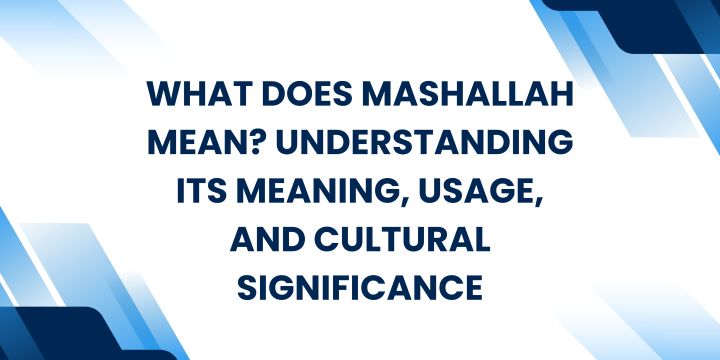“Mashallah” is a widely used expression across various cultures and languages, especially within Islamic traditions. Whether you’ve heard it during a conversation, read it online, or encountered it in media, you may have wondered what it truly means and why it’s so commonly used. This article explores the meaning, origins, usage, and cultural significance of “Mashallah.”
1. What Does Mashallah Mean?
The word “Mashallah” (ما شاء الله) is an Arabic expression that can be translated as “what God has willed” or “as God has willed it.” The phrase is often used to express appreciation, joy, or gratitude for something good that has happened or is being observed, attributing the outcome or beauty to divine will.
At its core, “Mashallah” is a way of acknowledging God’s role in the blessings, achievements, or beauty that one encounters. It’s a phrase that reflects humility and an understanding that, while humans can strive and work hard, ultimately, it is God’s will that allows things to happen.
2. The Origins of Mashallah
“Mashallah” derives from classical Arabic, with the root words being:
- Ma (ما): “what” or “as.”
- Sha’a (شاء): “to will” or “to wish.”
- Allah (الله): “God.”
When put together, the phrase literally means “what God has willed.” In Islamic theology, it emphasizes the belief that everything happens according to the will and plan of God. This concept is a central tenet of Islamic belief, where divine predestination plays a significant role in the understanding of life’s events.
3. When Is Mashallah Used?
“Mashallah” is a versatile expression used in various contexts. Let’s break down the situations where this phrase is often employed:
- Expressing admiration or amazement:
One of the most common uses of “Mashallah” is when seeing something beautiful, impressive, or praiseworthy. Whether admiring a person’s good health, success, or even natural beauty, people often say “Mashallah” to show their appreciation and to acknowledge that this beauty or success is a blessing from God.For example:- “Your baby is so adorable, Mashallah!”
- “You did an excellent job on your project, Mashallah!”
- Offering protection from envy (the evil eye):
In many cultures, “Mashallah” is believed to protect someone from jealousy or the evil eye. The evil eye refers to the negative effects of envy that can harm or bring misfortune to the person being admired. By saying “Mashallah,” one essentially prays for protection and acknowledges that the good in someone’s life is by God’s will, thereby safeguarding it from negativity.Example:- “You’ve achieved so much success in your business, Mashallah! May it continue to grow.”
- Celebrating personal achievements or milestones:
Saying “Mashallah” is a way of thanking God for personal accomplishments while maintaining a humble attitude. Whether it’s celebrating a promotion, a new house, or the birth of a child, saying “Mashallah” shows that while hard work was involved, divine intervention played a role in the outcome.Example:- “We’ve finally bought our dream home, Mashallah!”
- Appreciating nature and its beauty:
Many people use “Mashallah” when marveling at the natural world, such as a stunning sunset, a majestic mountain range, or the vastness of the ocean. The phrase acknowledges that all of creation is a reflection of God’s magnificence and power.Example:- “This view of the mountains is breathtaking, Mashallah.”
4. Mashallah and the Evil Eye
The evil eye, or “Al-‘Ayn” in Arabic, is a deeply rooted belief in many cultures, including Islamic culture. It is believed that excessive admiration or envy can bring harm to the object of that admiration. To protect against this, people often say “Mashallah” after praising someone or something.
The phrase is used to remind the observer that the beauty, success, or achievement being admired is a blessing from God, and not something that should evoke jealousy. By invoking God’s will, one hopes to ward off any negative effects that envy might bring.
5. Cultural Usage of Mashallah Around the World
While “Mashallah” is an Arabic expression, its usage transcends linguistic and cultural boundaries. It is commonly used by Muslims worldwide, and even in non-Muslim communities, particularly in regions influenced by Islamic culture. Below are some examples of how “Mashallah” is integrated into various cultures:
- In Arabic-speaking countries:
“Mashallah” is used in everyday speech to express admiration, gratitude, or appreciation. It’s heard in casual conversations, during family gatherings, and at celebrations. - In South Asian cultures:
In countries like Pakistan, India, and Bangladesh, where there is a significant Muslim population, “Mashallah” is a well-known phrase. Even among non-Muslims, it is used as a way of offering praise or congratulations. - In Turkish culture:
The Turkish adaptation of “Mashallah” is “Maşallah,” and it’s widely used to admire someone’s health, appearance, or success. It’s also common to see the phrase written in homes, shops, and even on vehicles as a protective charm against the evil eye.
6. Mashallah in Religious Context
In Islam, “Mashallah” is often associated with the broader concept of Tawakkul, which means trust and reliance on God’s will. Muslims believe that while they should strive and work hard, the ultimate outcome of their efforts is determined by God. Saying “Mashallah” reflects this trust in divine wisdom.
Moreover, the Quran, Islam’s holy book, also alludes to the phrase. One instance in Surah Al-Kahf (18:39) emphasizes using “Mashallah” when admiring something beautiful, attributing its existence to God’s will. This verse provides a scriptural basis for the cultural use of the phrase.
7. Common Misconceptions About Mashallah
Despite its frequent use, there are some misconceptions about “Mashallah.” One common misunderstanding is that it’s merely a word for complimenting someone. While it does express admiration, it’s deeper than a simple compliment—it’s an acknowledgment of divine will.
Another misconception is that it’s only a religious phrase for Muslims. In reality, many people from diverse cultural backgrounds use “Mashallah,” regardless of their faith, to show respect and appreciation.
8. How to Respond to Mashallah
If someone says “Mashallah” in admiration of you or something you have, a typical response would be to say “Jazakallah” (which means “May God reward you”) or simply offer a word of thanks. In some cultures, people may also return the compliment by saying “Mashallah” to the other person in response.
Conclusion
“Mashallah” is more than just a phrase—it carries layers of meaning rooted in faith, culture, and tradition. Whether used to express gratitude, offer protection, or admire beauty, this simple word serves as a reminder that all good things come from God’s will. So the next time you hear “Mashallah,” remember its deep significance, both in words and in heart.
By appreciating and understanding the context of “Mashallah,” you gain insight into not just the phrase itself, but the values of gratitude, humility, and reverence that are central to the cultures and people who use it.



